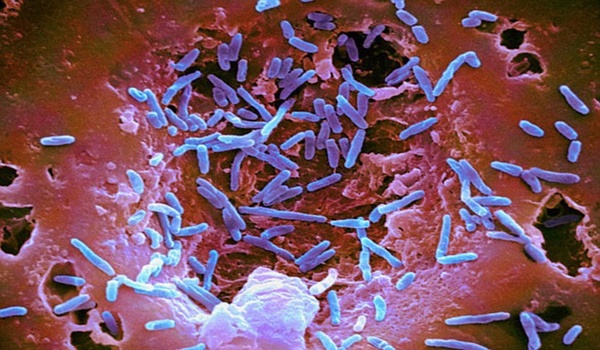Depression was characterized to be a “chemical imbalance” in the brain, but recently, scientists have discovered that things are far more serious than that.
The first theory defines depression, but it does not refer to the root causes of it, and scientists maintain that they might be various, including chronic stress and inflammation. Another recent study has also found that gut issues might result in depression and other mood disorders.
The belly contains 400 species of bacteria at one single moment, and many others also live on the skin. These bacteria contain genes which outnumber the ones in all body cells.
Namely, genomes of the bacteria and viruses of the human gut only are believed to encode 3.3 million genes. The gut actually protects the entrance of harmful pathogens into the bloodstream, which have managed to enter the digestive tract.
Gut bacteria are crucial and are even found in breast milk, and babies who are bottle-fed, lack these vital critters and have a higher chance to suffer from immune issues and allergies.
Bacteria are important for boosting the effects of enzymes like maltase, lactase, alkaline phosphatase, sucrase, and alpha-glucosidase, and for metabolizing cholesterol and triglycerides to maintain the stable blood pressure.
This is the reason why there are modern medical fecal transplants to reverse chronic issues, IBS, and inflammatory bowel disease. Gut bacteria boost the immune system, affect the brain, and regulate the balance between health and illness.
Experts from Griffith University in Queensland, Australia, analyzed the results of 7 former studies conducted on more than 300 volunteers in order to estimate the beneficial effects of probiotics in the treatment of perceived stress, anxiety, and depression.
In their words:
“Interest in the gut-brain axis and emerging evidence that the intestinal microbiota can influence central nervous system function has led to the hypothesis that probiotic supplementation can have a positive effect on mood and psychological symptoms such as depression and anxiety.”
Their conclusion was that “The meta-analysis showed that supplementation with probiotics resulted in a statistically significant improvement in psychological symptoms compared with placebo”.
Even though their research revealed the potential benefits of the treatments with probiotics, yet, there is a need for further scientific research.
Proceedings of the National Academy of Science published a research which indicated that Lactobacillus rhamnosus, a bacterium found in yogurt, gave positive effects in the case of anxiety and depression in mouse studies, and researchers contribute this to its action on the gamma-aminobutyric acid (GABA) system.
Oxford disease neurobiologists discovered that prebiotics have potent anti-anxiety effects, as they change the way we process emotional information. Oxford neurobiologist Dr. Philip Burnet, the study’s lead author, for an interview in the Huffington Post, said:
“Prebiotics are dietary fibers (short chains of sugar molecules) that good bacteria break down, and use to multiply. Prebiotics are ‘food’ for good bacteria already present in the gut.
Taking prebiotics, therefore, increases the numbers of all species of good bacteria in the gut, which will theoretically have greater beneficial effects than [introducing] a single species.”
This study involved 45 healthy adults between the ages of 18 and 45, who received either a prebiotic or a placebo in a period of three weeks, and their mental state was analyzed through computer tests which processed emotional information.
The participants who received a prebiotic group were found to be much less sensitive to negative information and experienced less anxiety than the others.
Moreover, the saliva tests showed that they had reduced cortisol (a stress hormone related to anxiety and depression).
According to Dr. Kirsten Tillisch, the study’s lead author,
“Time and time again, we hear from patients that they never felt depressed or anxious until they started experiencing problems with their gut. Our study shows that the gut–brain connection is a two-way street.”
Psychology Today published the explanation of Ted Dinan, a professor of psychiatry at University College Cork:
“there are three basic mechanisms underlying the astonishing connection between these lowly microorganisms and our very personalities:
(1) Bacteria that live in the gut (or travel through it aboard some yogurt) are necessary building blocks in the production of neurochemicals there, like serotonin and dopamine.
(2) That impact on neurochemicals, in turn, has an effect on the secretion of stress hormones like cortisol. (3) Gut bugs also play a vital role in regulating the immune system and the inflammatory response it can launch when things go haywire. Inflammation is now widely considered to be one underlying cause of depression.”
The health of the gut supports the health of the mind
Our mental health is complex and might be affected by numerous factors, like inflammation, stress, and diseases. As our diet is the foundation of health, healthy dietary changes might be of great help in reducing the effects of these factors.
Therefore, in order to heal the gut, you should avoid sugar, alcohol, and processed foods, and increase the intake of nuts, fresh foods, vegetables, legumes, and grains.
Eat probiotics, spices, and anti-inflammatory foods, and stay hydrated. Furthermore, make sure you exercise regularly, manage stress, sleep well, and after the use of antibiotics, replenish the gut bacteria.
The following list contains foods and drinks which are rich sources of probiotics and prebiotics:
- Kefir
- Miso
- Sourdough bread
- Yogurt
- Sour cream
- Kombucha
- Sauerkraut
- Cottage cheese
- Kimchi
- Tempeh
- Natto
- Lassi
Therefore, depression and anxiety might be controlled, prevented, and treated with a little effort. Give your best!


